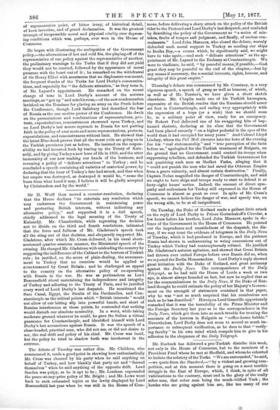He began with illustrating the ambiguities of the Government policy,—the
alternations of hot and cold fits, the playing-off of the representative of one policy against the representative of another, the preliminary warnings to the Turks that if they did not yield they would not be coerced, followed by the appearance of moral pressure with the heart out of it ; he remarked on the withdrawal of Sir Henry Elliot. with assurances that no displeasure was meant, the frequent thanks of the Turks for Lord Derby's communica- tions, and especially for " the delicate attention," as they term it, of Mr. Layard's appointment. He remarked on the recent change of tone in Lord Derby's account of the autumn meetings, as "got up " and mischievous,—of the new condemnation lavished on the Russians for placing an army on the Pruth before the Conference, though Lord Salisbury had described the fear of Russia as the one motive-power of the Conference. He dwelt on the permutations and combinations of representations, pro- tests, expostulations, remonstrances showered upon Turkey, and on Lord Derby's last severe reproach to Russia for not putting faith in the policy of ever more and more representations, protests, expostulations, and remonstrances without limit. He showed that the latest Blue-book proves that all the worst evils are going on in the Turkish provinces just as before. He insisted on the respon- sibility we had incurred both by tearing up the Treaty of Kain- ardji, and by giving Turkeys new lease of life in 1856, and the utter immorality of our now washing our hands of the business, and resuming a policy of " delicate attentions " to Turkey ; and he concluded a speech containing all varieties of oratorical power, by declaring that the hour of Turkey's fate had struck, and that when her empire was destroyed, as destroyed it would be, " come the boon from what hand it may, I believe it will be gladly accepted by Christendom and by the world."


































 Previous page
Previous page